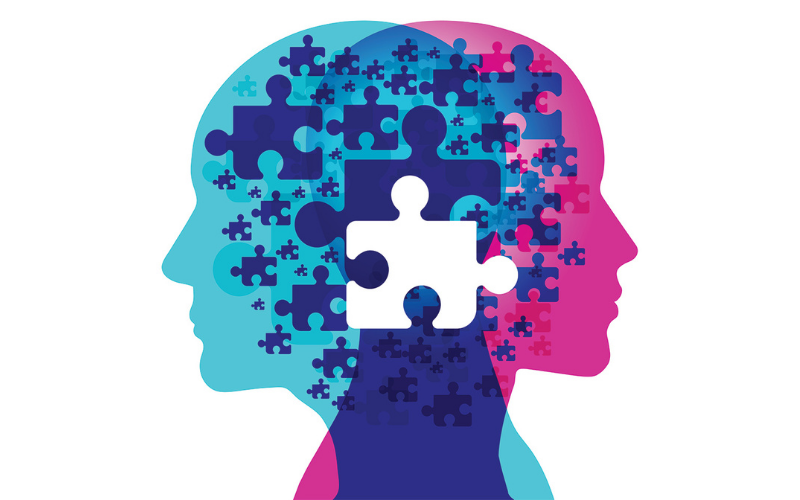As children, we are sponges. We learn language, reading, math, social skills, and even how to feed ourselves. Unfortunately, some of the information we absorb isn’t as useful as learning manners, multiplying, or reaching that spoon to our mouths.
In fact, our upbringing–for better or worse–can instill certain beliefs that haunt us well into our adulthood. They can limit how we see ourselves and the world around us.
Unfortunately, there’s no way to avoid it. Even with the best intentions, our parents, teachers, authority figures, and even peers can ingrain lasting beliefs about how we should think and act. Everyone has opinions about the “right” way to live in this world. Some are positive and very helpful–like respecting elders or being assertive.
Of course, not everything you learn is helpful and serves your higher purpose. You absorb both good and bad beliefs along the way. Sadly, some very harmful opinions may be embedded into your subconscious before you even had an inkling that they were limiting you.
Some learned beliefs may be detrimental to yourself and your worldview. For example, racism, suppressing emotions, and believing you don’t deserve success can become SUBCONSCIOUS roadblocks keeping you from your higher good.
You may have heard these referred to as LIMITING BELIEFS. Basically, it’s the story you keep telling yourself about some aspect of your life. For example:
- Anything beginning with “I can’t…”
- “I am not good enough.”
- “I failed before, so…”
- “Others do it better.”
- “I don’t have the time.”
- “But I may be rejected.”
- “I’m not worthy of…”
Are you ready to change the story you’re telling yourself? Want to create a mindset where you embrace success, love, and opportunity? Let’s take a closer look at how learned beliefs and your SHADOW can be affecting your everyday life.
Understanding Our Shadow Self
Carl Jung, a Swiss psychiatrist, coined the term “shadow” back in the 1950s. He said the “shadow” is a collection of repressed aspects of our identity–things we choose to repress or reject about ourselves. These repressions can be due to society norms or things we learned while growing up.
The “shadow” is the aspects of ourselves we don’t like, hide, deny, think are bad, or turn away from.
For example, as a child, we may learn it’s not okay to express:
- Sadness
- Anger
- Jealously
- Fear
- Loneliness
- Vulnerability
Maybe it is due to stoic parents or a misguided lesson you learned during a difficult time. You form these beliefs to avoid future negative or distressing emotions. You’re protecting yourself from further harm or embarrassment.
Most of the time, it’s SUBCONSCIOUS. Without even knowing, the shadow creates a lasting effect. It impacts how you handle situations everyday!
In fact, even positive emotions like confidence, self-worth, beauty, and success could be associated with the shadow. Maybe a bully kept pestering you saying you were ugly. Or a frustrated teacher said you would never succeed at a particular subject.
Here’s a great example. Something that’s stuck with me even to this day. In 5th grade, I remember my teacher telling me I was a terrible writer. She said I wrote like I spoke. And, well, most grade school teachers expect something more lofty, I suppose.
So I believed I was a terrible writer for WAY TOO LONG. It wasn’t until I started working hard on social media marketing that I realized she was wrong. My style of writing served an IMPORTANT purpose and was very VALUABLE to me and my clients–even if I didn’t always use semicolons the right way or fill a post with three-syllable words. I used my personal strengths in writing to help others.
As we learn and grow, we categorize what we think is right and wrong. We hide away what we believe is wrong. We pretend it is not us so we can be accepted by parents, siblings, peers, or society.
But “the wrong” doesn’t go away. It is a part of us. Our shadow. And, unless we confront our shadow self and do the work, we are limiting our views and personal development.
Pretty heavy? Yes. It certainly can be. We’re talking about deep subconscious beliefs you may not even be aware about…unless YOU DO THE WORK!
Doing the shadow work, however, opens doors and possibilities. The shadow changes when you own and embrace it. So…are you ready to:
- Stop making excuses for not living your DREAM LIFE?
- Embrace who you are and use it to YOUR advantage?
- Use your STRENGTHS to blaze trails in your business?
- Accept YOURSELF and all you have to offer the world?
- Stop living on AUTOPILOT with the outdated story you’re telling yourself?
- Develop work and personal relationships that UPLIFT your purpose?
- Discover why FEAR has been HOLDING YOU BACK for TOO LONG?
GREAT! Then let’s get started…
Identifying Your Shadow Self
One of the easiest ways to identify your shadow is being aware when someone triggers you. Have you ever met with a client that totally INFURIATES you…BUT others keep mentioning how this is a great client? Has a new acquaintance rubbed you the wrong way, but not sure why? Is there someone in your life that is an expert at pushing your buttons?
That’s spotting the shadow! It’s your shadow self reflecting back at you. The things we reject in other people are a good indicator of the aspects of self we are rejecting or hiding away.
To put it in its simplest form…if you spot it, you got it.
Being triggered means there is something unresolved within you. This is not necessarily a bad thing…it’s just something that needs to be acknowledged, accepted, and worked through.
Like it or not, we all possess every single human quality to a degree. And, of course, we rather avoid negative things than embrace and change them head-on. We develop personas that are opposite to qualities we find unfavorable.
After all, we are social beings. We want to fit in. We have a deep biological need not to be “cast out” from the tribe. In the past, being cast out led to severe hardships and even death. Fitting in meant survival.
But, these days, belonging to a tribe isn’t necessarily a survival mechanism. In fact, the desire to “fit in” to a certain group may be doing more harm than good. Creating personas that don’t align with your true purpose allows your shadow self to flourish.
The good news: you can be authentic with yourself and others. You can overcome beliefs that serve no purpose for you.
Confronting Your Shadow
Seeing the shadow in ourselves is very difficult. It’s easy, even obvious, to see flaws in other people. But turning our focus within takes courage, strength, and a strong desire to develop beyond our perceived limitations.
Confronting your shadow starts with awareness. When you are aware of your shadow triggers, you can actively begin the process of identifying situations when your repressed thoughts and beliefs are controlling your emotions.
Your Emotions are the #1 THING That Can Derail Your Path to Success
You need to take a step back from triggering situations. Breathe. Don’t react…reflect.
Learn how to identify and feel your emotions as they arise. Take ownership and responsibility of your emotions–even when you don’t like how you’re reacting.
Once you learn to manage energy and mindset you take control. Control unfolds potential and dissolves melodrama. Your perceptions and interpretations change. It’s easier to make positive, conscious choices.
Mindfulness and meditations helps. Journaling is also a great resource. Anything that helps you get out of the current whirlwind of your emotions and focus on the present allows you to be more grounded and aware of your shadow and triggers.
Want to learn more about your shadow and ways to confront it? Tris Thorp–a bestselling author and healer and I had an amazing discussion in a recent podcast. I learned quite a bit from this podcast, and I know there are some key takeaways for you too!









